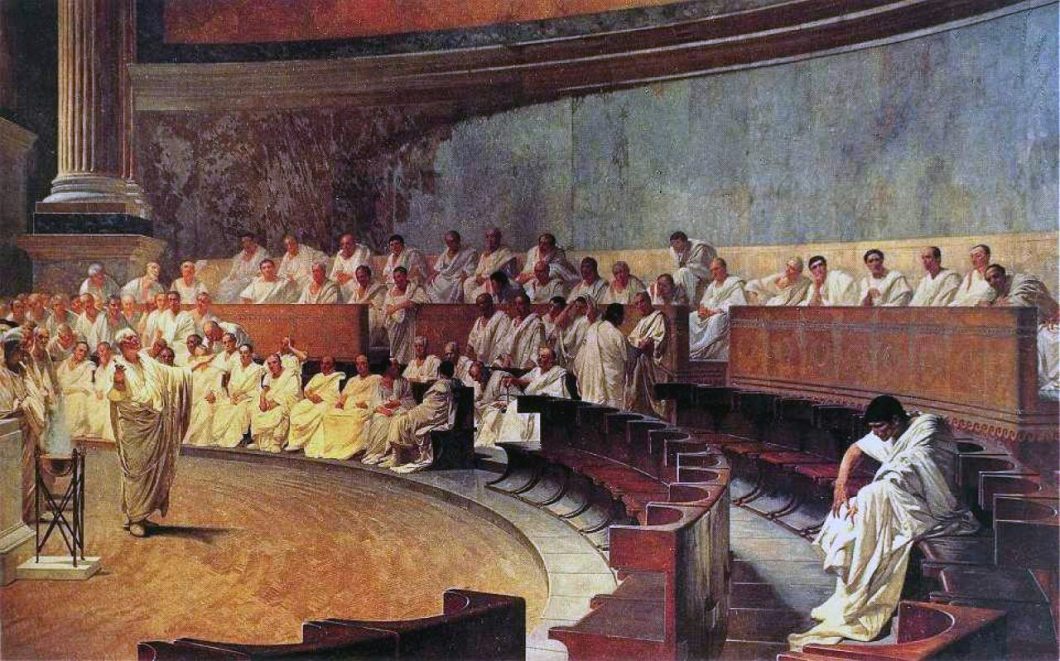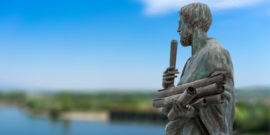For Smith, commerce is not about consenting to contracts but individuals surfing waters highly charged with solemnities of ritual, trust, and reverence.
Why We Need the Freedom of Aristocrats
Polish statesman and political philosopher Ryszard Legutko has written an essential guide to understanding the ongoing debasement of freedom. In The Cunning of Freedom: Saving the Self in an Age of False Idols, Legutko analyzes the main contours of modern freedom: negative freedom, the pyramid scheme of rights, inner freedom, the non-existent self, and the minimal self. He finds them hopelessly deficient and, when understood correctly, he argues, these concepts of freedom are playing a shell game. They traffic in soft concepts of toleration, compromise, authenticity, openness; but, Legutko rejoins, modern understandings of freedom are hardened ideologies that evict classical and religious notions of freedom from respectability and the public square. Modern freedom is anything but neutral regarding how people should live.
The classical and biblical understanding of freedom is built on the soul, conscience, and virtue and the view that our freedom is a prudential opportunity to make ourselves worthy in the pursuits of human life with others in family, civil society, political community, education, and religion. To such vertical articulations of freedom, the modern turn asserts that real freedom is the assertion of the self, stripped of any encumbrances that it judges to stand between it and the object of human desires. Here is the source of its rigid exclusiveness, the intolerance of tolerance that we have come to understand so very well.
Legutko’s incisive short chapters on the problem of freedom aim to recover its hierarchical nature; that those who exercise it well by their virtue are estimable persons who know how to bring excellence and order to themselves and to any enterprise or association they lead. It is this radical—from our perspective—unequal quality of liberty that he wants us to see. This is, of course, a notion that our liberty and our choices participate in something higher and more exalted than our frail human condition. Our freedom isn’t good because we have nothing left to lose, or because it enables us to live deconstructed autonomous lives bereft of authority, but is precious because it is how we show our devotion to and reflect in our actions the eternal laws that govern us.
Modernity’s lowering of freedom began with the state of nature hypothesized by Hobbes, Locke, and Rousseau, Legutko judges. This rational construct removed human beings from Prince and Pope, tradition and law, and threw them back on their own devices, in order to build an artificial political order that would protect rights. The teaching held that human beings should be primarily understood as individuals, with family and communities in the background. Secondly, the state of nature posited the equality of all people. Both arrangements, Legutko observes, are far from self-evident and radically reduce the complexity of human beings.
Freedom can’t be portioned out in chunks to citizens in transfer payments or healthcare programs. Legutko’s discussion points higher than entitlements and mandated equality, he wants us to find the soul and meaning of freedom.
I disagree with Legutko’s characterization of equality in one crucial respect. He quotes Hobbes’ strained attempts to justify the intellectual and physical equality of human beings in order to underscore how difficult equality is to accept as a self-evident notion. But Legutko does not provide an argument for how we can be considered equal under the law on the basis of our shared human nature. And surely, an equality rooted in our human nature that also grounds our liberty under law is essential to warding off the egalitarianism run amok that we presently confront. I agree with Legutko’s argument that the state of nature teaching offered a new creation story for human beings to think about freedom, equality, and politics. Where I leave off is the subtle hint that maybe political equality is only a myth.
He further compounds this error by leveling criticisms of the Declaration of Independence as an unsupported egalitarian document containing unfocused language that seemingly paves the way for the tyranny of liberalism. Quoting Legutko: “in no way can one justify a statement that all men “are endowed by their Creator with certain unalienable rights […] among these […] Life, Liberty, and the pursuit of Happiness.”” Legutko argues that nothing in the Christian tradition nor in the history of philosophy could justify such an “outlandish contention.” The Declaration of Independence, however, should not be read as a theological or philosophical treatise, even the important second paragraph must be understood as a political statement in a negotiated document, drafted by Thomas Jefferson and revised and agreed to by the Continental Congress.
“We hold these truths” means us, we, those assembled here representing the independent states make a judgment that man comes to our political order with certain rights which will be protected by the government. Legutko does not note that much of the Declaration is rooted in English abuses of common law rights and norms that precipitated the push for colonial independence. The statement of their equality is a claim that they have the authority as a constituted political community to separate from the British Empire under this long train of repeated abuses.
As to Christianity, the very notion that human beings cannot be defined by an official government ideology and possess the liberty to pursue their Happiness is a difficult notion to arrive at apart from the inheritance of Christianity which has ennobled human nature with the teaching of the Incarnation. Our freedom matters greatly and it exists apart from the government. Moreover, Americans firmly understood, as Tocqueville notes at length, that their liberty was exercised under God and the law. They were accountable for their actions to God, family, and their wider community. The Declaration’s claims were understood by no one to license the empty and nominalistic autonomy that characterizes much of the public mind in contemporary western democracies. The deformations of American liberty come from other sources, not from the ideas of the Declaration. True, abstractions can be lifted from the Declaration to justify an endless train of new rights, but this is done without the full measure of the moral, philosophical, and religious meaning that informs the Declaration.
Legutko quickly returns to firmer footing in analyzing how unbounded rights claims have undermined freedom and a morally serious form of republican politics. The legitimacy of the state is now judged by how decisively it upholds rights claims, this has become the ultimate mandate for action. And those claims are not limited to prepolitical rights but encompass everything that citizens can implore on behalf of the public order for their individual benefit. Thus does the European Court of Justice’s dictates of humanitarianism become the arbiter of legitimacy for European state governments. Left out of this kind of a politics is the actual representation of the nation’s concrete interests. Instead, we see the transformation of communal political interests into an individualistic idiom.
We have two abstractions: the autonomous individual and humanity writ large. The rights-based republic struggles to engage in substantive deliberation about what a political community might need to thrive as a collective whole. Legutko notes that human rights emerged in an antipolitical sense “through declarations and charters-that is, through an arbitrary political act of will that by definition requires no prior rational validation.” And it is this antipolitical sense that rights claims have nailed into Western law, removing us from deliberation and compromise, we struggle to value our relational obligations that lift us above mere individualism.
Legutko notes that negative freedom—the most sober understanding of rights-based politics—is insufficient for human action, which is not to dismiss the need for space more or less sealed from the government in which we can pursue our interests. But such space does not provide us with a compelling rationale for freedom and its defense. It is true, Legutko notes, that in shaking off tyranny, people appeal to lives unburdened by harsh, arbitrary power. However, that newfound freedom is usually filled by people who place in it “their most precious aspirations, usually those that tyranny has subdued.” We love freedom, but “We attach to it many, often too many, of our hopes and ideals, and we hardly ever distinguish between freedom itself and the hopes and ideals that go along with it.” These include objectives like meaning, justice, “fairer laws,” and a collective freedom that is ennobling. While negative freedom is important, the life of a territorial people who must live and function together as a nation under law is what historically has driven the desire for freedom overall, Legutko states.
In considering “Positive Freedom” Legutko introduces us to how liberty, rightly understood, involves qualities of personal excellence. Liberty is really about virtue, and this, Legutko contends, is why Rawls’ attempt to set forward a political system for the equal uses of liberty displaces what is most needful: the individual using freedom with a certain “aptitude” and skill that enables command and authority. Rawls frets over the size of the social democratic state that can somehow make inequality work for those lesser off, equalizing life’s circumstances. Legutko doesn’t exactly put it this way, but Rawls’ attempt “to give a theoretical description of the system that offers people conditions which would somehow disarm negative freedom’s paradoxes” never finally equals real human effort. Freedom can’t be portioned out in chunks to citizens in transfer payments or healthcare programs. Legutko’s discussion points higher than entitlements and mandated equality, he wants us to find the soul and meaning of freedom.
So it’s instructive, if not provocative, when Legutko dispatches Rawls and ushers in Aristotle’s free man: “courageousness, a sense of justice, resolution, fortitude, magnanimity, and self-control.” Aristotle’s free citizen sets goals and objectives to be achieved and makes judgments about the corresponding means. And, Aristotle notes, those who are unfree, who act as slaves, are unable to do so. Legutko observes that Aristotle does not attribute to slavery a natural or born status. In Aristotle’s classical world slavery was a legal status rendered postbellum to the conquered, almost an accident. There were legal slaves with free citizen capacities.
Legutko places before the reader the most elemental position about human nature and freedom to argue that freedom when used well brings order, flourishing, and elevated souls. Are we capable of that freedom, or are we really slaves to our passions, base instincts, and ideologies of progress and emancipation, which in many countries are accorded a secular sacred status?
Liberal democratic societies need the aristocratic virtues, Legutko articulates. Tocqueville argues something very similar throughout Democracy in America where he judges democratic societies more just than aristocratic ones, but they incline towards soft despotism if their tendencies toward egalitarianism and pantheism are left unchecked. Enter the aristocratic virtues, which for Tocqueville, involve the associative arts, family, religion, and local government. In these institutions, democratic citizens are raised beyond themselves and must engage in self rule with other people. Legutko, however, urges that the chief aristocratic contribution we should heed is to place the soul higher than the body.
The appeal made by Legutko is to the classical rendering of the soul in judgment over the body and the pressures the body makes for action. The body, Legutko notes, has been in judgment of the soul for too long, and the disorder is all around us. More than this, the aristocrat will reject historical inevitability as a reason to accept any ideology or social trend. The soul looks to our obligations to wisdom, faith, country, family, and friends to determine what should be done. In this, it is captive not to rights but to the duties of human beings. Legutko notes that we don’t break faith with our obligations, rather we use our freedom to uphold our country, our family, our community, our friends, and for those who believe, our faith.
The rights-based egalitarian order of present struggles to understand these things as anything but encumbrances to the authentic self. So those who would translate the aristocratic soul into our contemporary system confront powerful countervailing tendencies. And yet, we might say to those who hurl epithets on behalf of the now traditional emancipated individual, living under no one’s rule but their own, ‘Look at what you’re defending!’ The West is everywhere in demographic, military, and financial decline as its denizens struggle to see the point of even reproducing or doing anything that might imperil or challenge the ever-present suck of the secular person who equates the end of Being with the demise of his mortal body. Western man considers himself beyond the nation, family, religion, i.e., postpolitical, postfamilial, and postreligious, in Pierre Manent’s formulation. In the final analysis, contemporary western citizens will find themselves lonely, naked, and afraid.
All that will be left is the soul and the need to build again. We’re already there.



